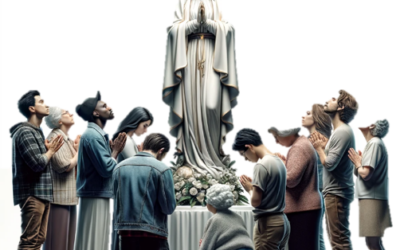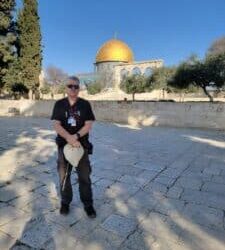The Quran is supposed to be an eternal and unchangeable revelation written on tablets in heaven in Arabic and dictated to Muhammad word for word. If this is the case, then even Muhammad himself could not add to or change it. Strikingly, however, according to Muslim tradition, Muhammad actually made changes even while he was revealing it, adding to the Quran in response to the thoughts and needs of his followers. Perhaps the clearest example is found in the most trusted collection of the Hadith, Sahih Al-Bukhari:
“There was revealed: ‘Not equal are those believers who sit (at home) and those who strive and fight in the Cause of Allah.’ (4.95) The Prophet said, ‘Call Zaid for me and let him bring the board, the inkpot and the scapula bone (or the scapula bone and the ink pot).’ Then he said, ‘Write: ‘Not equal are those Believers who sit..’, and at that time ‘Amr bin Um Maktum, the blind man was sitting behind the Prophet. He said, ‘O Allah’s Apostle! What is your order For me (as regards the above Verse) as I am a blind man?’ So, instead of the above Verse, the following Verse was revealed: ‘Not equal are those believers who sit (at home) except those who are disabled (by injury or are blind or lame etc.) and those who strive and fight in the cause of Allah.’ (4.95),” (Sahih Al-Bukhari; Volume 6, Book 61, Number 512).
Muhammad put forward as a revelation from God an exact verse that said that those who stay home are not equal to those who go out and fight in Jihad. Because a blind man expressed his concerns that he was physically unable to go fight, however, the verse was changed to include an exception clause for those who are injured or disabled. The exception clause may be quite reasonable, but it was not part of the original dictation Muhammad claimed to have received from the Angel Gabriel. If Muhammad really received eternal and unchangeable words from a heavenly book, this exception clause could not be added to it, no matter how reasonable it might be. That which is eternal and unchangeable cannot be changed, no matter how pressing the need. If anyone, even Muhammad, can adjust the wording and content of the Quran in this way, then this completely contradicts the Orthodox perspective on what the Quran is.
The Hadith offer us other such accounts. For example, several verses are said to have been revealed by Muhammad at Umar’s request:
“Narrated ‘Umar (bin Al-Khattab): My Lord agreed with me in three things:
- I said, ‘O Allah’s Apostle, I wish we took the station of Abraham as our praying place (for some of our prayers). So came the Divine Inspiration: And take you (people) the station of Abraham as a place of prayer (for some of your prayers e.g. two Rakat of Tawaf of Ka’ba)’. (2.125)
- And as regards the (verse of) the veiling of the women, I said, ‘O Allah’s Apostle! I wish you ordered your wives to cover themselves from the men because good and bad ones talk to them.’ So the verse of the veiling of the women was revealed.
- Once the wives of the Prophet made a united front against the Prophet and I said to them, ‘It may be if he (the Prophet) divorced you, (all) that his Lord (Allah) will give him instead of you wives better than you.’ So this verse (the same as I had said) was revealed. (66.5),” (Sahih Al-Bukhari; Volume 1, Book 8, Number 395).1
Unlike in our first example where a revelation was given and then afterward clearly changed to accommodate a request, in these instances whole revelations are given in response to requests. Because of this, one could argue that it just so happened that these verses Umar asked for were already in the eternal Quran and would have eventually been revealed anyway. The account, however, seems to indicate that these revelations come because Umar first asked for them; that his Lord is agreeing with him. Indeed, in the third instance, Umar’s exact words essentially were the revelation (Surah 66:5). When we combine these cases with our first example, there seems to be a pattern of Muhammad adding to the Quran based on the needs and requests of his people.
The tafsir literature (the early commentaries on the Quran) offers us yet another possible example. Al-Badawi explains that the Quranic verse, “Who is more wicked than the man who invents a falsehood about God, or says: ‘This was revealed to me’, when nothing was revealed to him? Or the man who says, ‘I can reveal the like of what God has revealed’?” (Surah 6:93) was actually revealed to Muhammad to denounce a specific man:
“‘To me it has been revealed,’ when naught has been revealed to him’ refers to `Abdallah Ibn Sa`d Ibn Abi Sarh, who used to write for God’s messenger. The verse (23:12) that says, “We created man of an extraction of clay” was revealed, and when Muhammad reached the part that says, “… thereafter We produced him as another creature (23:14), `Abdallah said, “So blessed be God the fairest of creators!” in amazement at the details of man’s creation. The Prophet said, “Write it down; for thus it has been revealed.” `Abdallah doubted and said, “If Muhammad is truthful then I receive the revelation as much as he does, and if he is a liar, what I said is as good as what he said,” (Abdallah Ibn `Umar al-Badawi, Anwar al-Tanzil wa Asrar al-Ta’wil, Explaining Surah 6:93)
What is interesting to note here is that Al-Badawi reports the episode as being technically true. He denounces Abdallah b. Sa’d for his presumptuous response but seems to indicate the event did actually happen. In other words, if the commentary of Al-Badawi is to be trusted, Abdallah b. S’ad really is the one who said the words “So blessed be God the fairest of creators!” in response to Muhammad’s revelation, and those words of Abdallah did end up in the Quran. Other tafsirs also tell similar stories. Abdallah b Sa’d may well have been a liar and a self-aggrandizing apostate as the tafsir literature universally accuses him of, but Abdallah’s alleged sin is in his doubt of Muhammad and his subsequent arrogant boasting. What is key is that Al-Baidawi’s report affirms that Abdallah is, in fact, the one who uttered the words, “So blessed be God the fairest of creators!” and that Muhammad did include Abdallah’s words in the revelation. If the Tafsir literature is to be trusted, it certainly appears we have an additional example of a phrase being added to the Quran because of Muhammad’s circumstances while revealing it rather than being what was dictated to him by Gabriel. All of Abdallah’s later exaggerated braggadocio does not take away from the fact that his apostasy appears to go back to a moment that Al-Badawi accepts as technically true, a moment where Abdallah uttered words of astonishment that Muhammad then added to the supposedly unchanging revelation.
So we have at least one and arguably several examples in the Muslim tradition of Muhammad adding things to the Quran at the very moment he was revealing it. In each of these, he is responding directly to the people and circumstances around him. This poses serious problems for the Orthodox Muslim perspective on the nature of the Quran as eternal and unchangeable.
References
| 1↑ | The very next Hadith (Sahih Al-Bukhari; Volume 1, Book 8, Number 396) is a virtually identical account of the exact same thing. |
|---|





